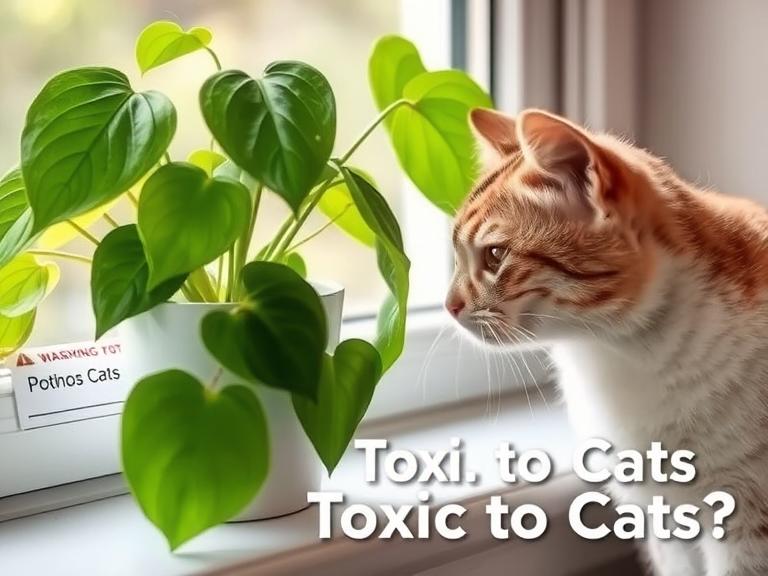Pothos plants, also known as Epipremnum aureum, are popular houseplants due to their lush foliage and low-maintenance care. However, many pet owners wonder: Are pothos toxic to cats? The short answer is yes, pothos can be harmful to cats if ingested.
In this article, we’ll explore why pothos are dangerous for cats, the symptoms of poisoning, what to do if your cat eats pothos, and safer plant alternatives.
Why Are Pothos Toxic to Cats?
Pothos plants contain insoluble calcium oxalate crystals, which are toxic to cats (as well as dogs and other pets). When a cat chews or bites into a pothos leaf, these needle-like crystals penetrate the soft tissues of the mouth, throat, and digestive tract, causing irritation and discomfort.
Toxic Components in Pothos
- Calcium Oxalate Crystals: Cause immediate pain and swelling in the mouth.
- Enzymes and Saponins: May contribute to gastrointestinal upset.
While pothos poisoning is rarely fatal, it can lead to significant discomfort and may require veterinary attention.
Symptoms of Pothos Poisoning in Cats
If your cat has chewed on a pothos plant, watch for these symptoms:
Mild to Moderate Symptoms
- Drooling or excessive salivation (due to oral irritation)
- Pawing at the mouth (sign of pain)
- Swelling of the lips, tongue, or throat
- Vomiting or gagging
- Loss of appetite
Severe Symptoms (Rare Cases)
- Difficulty breathing (if swelling blocks the airway)
- Lethargy or weakness
- Dehydration from vomiting
If your cat shows severe symptoms, seek immediate veterinary care.
What to Do If Your Cat Eats Pothos
If you suspect your cat has ingested pothos, follow these steps:
- Remove the Plant: Take the pothos away from your cat to prevent further ingestion.
- Rinse the Mouth: Gently flush your cat’s mouth with water to remove residual crystals.
- Offer Water or Milk: This can help soothe irritation.
- Monitor Symptoms: If mild symptoms persist for more than a few hours, call your vet.
- Seek Veterinary Help: If severe symptoms appear, visit an emergency vet immediately.
Your vet may administer anti-inflammatory medications, pain relief, or IV fluids if needed.
How to Keep Cats Safe from Pothos
Since pothos are toxic, the best prevention is to keep them out of reach or opt for pet-safe plants. Here are some tips:
1. Place Pothos Out of Reach
- Hang pothos in high places where cats can’t jump.
- Use closed terrariums or shelves.
2. Use Deterrents
- Spray bitter apple spray on leaves (non-toxic but unpleasant for cats).
- Place aluminum foil or double-sided tape around the plant to discourage chewing.
3. Choose Cat-Safe Plants Instead
If you want greenery without the risk, consider these non-toxic alternatives:
- Spider Plant (Chlorophytum comosum)
- Boston Fern (Nephrolepis exaltata)
- Areca Palm (Dypsis lutescens)
- Cat Grass (Dactylis glomerata)
FAQs About Pothos and Cats
1. Can pothos kill cats?
Pothos poisoning is rarely fatal, but severe cases (like airway obstruction) can be life-threatening. Immediate vet care is crucial.
2. How quickly do symptoms appear?
Symptoms usually appear within minutes to a few hours after ingestion.
3. Are all pothos varieties toxic?
Yes, all pothos varieties (Golden Pothos, Marble Queen, Neon Pothos) contain calcium oxalate crystals.
4. What if my cat only took a small bite?
Even small amounts can cause irritation. Monitor for drooling or vomiting and rinse their mouth if needed.
5. Can I still keep pothos if I have cats?
Yes, but keep them completely out of reach—hanging planters or closed rooms work best.
Final Thoughts
Pothos plants are toxic to cats due to their calcium oxalate crystals, which cause oral and gastrointestinal irritation. While not usually deadly, ingestion can lead to significant discomfort. Prevention is key—either keep pothos away from cats or choose safer plant alternatives.
If your cat does chew on pothos, act quickly by rinsing their mouth and contacting a vet if symptoms worsen. By taking precautions, you can enjoy houseplants while keeping your feline friend safe.
Would you like recommendations for more cat-friendly plants? Let us know in the comments!
Disclaimer: This article is for informational purposes only and not a substitute for professional veterinary advice. If your cat shows signs of poisoning, consult a vet immediately.

